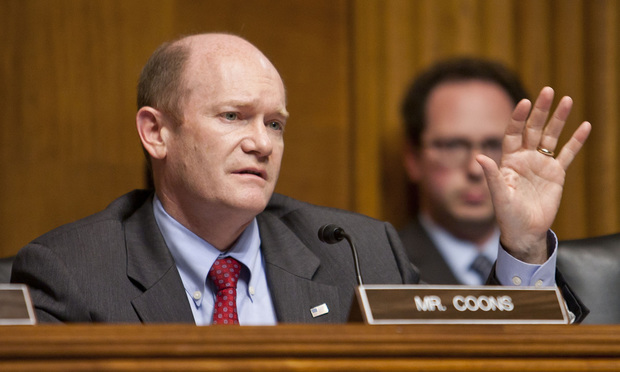Coons' Bill Adds 2 Temporary Judges to Busy Del. Bankruptcy Court
The U.S. Senate this week approved legislation to provide five years of reinforcement for Delaware's bankruptcy court, one of the busiest in the nation.
October 26, 2017 at 03:25 PM
4 minute read
The original version of this story was published on Delaware Law Weekly
 Chris Coons.
Chris Coons. The U.S. Senate this week approved legislation to provide five years of reinforcement for Delaware's bankruptcy court, one of the busiest in the nation.
The bill, sponsored by Sen. Chris Coons, extends Delaware's five existing temporary bankruptcy judgeships and creates two new ones on the U.S. Bankruptcy Court for the District of Delaware, which has just one permanent judge in Wilmington. Both the existing posts and the new ones are set to expire after five years.
The measure was included with a $36.5 billion disaster-relief bill, which passed the Senate Tuesday on a 82-17 vote and now heads to the desk of President Donald Trump, who was expected to sign it within 10 days.
“I am pleased this bipartisan law will give our bankruptcy courts the judges they need to manage pressing caseloads,” Coons said Tuesday in a statement. “Delaware has rightly earned its reputation for having one of the most highly regarded bankruptcy courts in the country, and this law ensures that our court has the additional judgeships it needs to administer justice.”
The bankruptcy court has been operating with the assistance of five temporary judges since 2005, when Congress created 27 temporary judgeships amid a national rise in bankruptcy filings. The positions were renewed for five more years in 2012, but expired in May, setting up what the Judicial Conference of the United States warned could be a “debilitating workload crisis” if they were not made permanent.
Should any of the temporary judges have retired or been unable to serve after the May 25 expiration date, the position would have been lost altogether.
In a letter to Congress, the Judicial Conference, which frames policy guidelines for the federal courts, urged lawmakers in April to convert 14 of the temporary judgeships, including all five in Delaware, to permanent status.
“The U.S. Bankruptcy Court for the District of Delaware, for example, would be crippled as five of their six authorized judgeships are temporary, all with the risk of expiring in 2017,” the Judicial Conference said.
In May, Coons introduced legislation calling for the conversion of all 14 temporary judgeships to permanent positions. The measure passed the Senate by unanimous consent in September but was never taken up in the U.S. House of Representatives, according to congressional records. Instead, a revised measure later emerged in a compromise and was included with a House bill authorizing federal funds to assist the victims of a recent string of hurricanes and wildfires.
Under the new bill, the temporary judgeships were extended and new short-term positions were added for Delaware, Michigan and the Middle District of Florida. However, no new permanent judgeships were added.
Jeremy W. Ryan, chair of the Delaware State Bar Association's bankruptcy law section, praised the bill, saying the new temporary judgeships would “ease the burden” of Delaware's six current judges. But he also acknowledged the need to eventually create more permanent positions on the bench.
“A permanent solution would always be much preferred, but this is certainly a step in the right direction,” said Ryan, a partner with Potter Anderson & Corroon.
A spokesman for Coons said that he did not plan to move another bill in the near term, but the senator would be monitoring the Administrative Office of the Courts moving forward.
Delaware, like most jurisdictions across the country, has seen an overall decline in bankruptcy filings since the financial crisis caused filings to peak in 2009. In 2016, new filings in Delaware fell to 2,951, down 36 percent from a high of 4,630 seven years prior, according to statistics from the Judicial Conference.
However, Delaware's docket still has a high number of Chapter 11 cases, which tend to be more complex than other bankruptcy filings, and “mega” cases—filings involving at least $100 million or 1,000 creditors or more—have also been on the rise, causing some to express concern for the long-term stability of the court.
“We would certainly hope at some point we could make these all permanent,” Ryan said.
This content has been archived. It is available through our partners, LexisNexis® and Bloomberg Law.
To view this content, please continue to their sites.
Not a Lexis Subscriber?
Subscribe Now
Not a Bloomberg Law Subscriber?
Subscribe Now
NOT FOR REPRINT
© 2025 ALM Global, LLC, All Rights Reserved. Request academic re-use from www.copyright.com. All other uses, submit a request to [email protected]. For more information visit Asset & Logo Licensing.
You Might Like
View All
Zoom Faces Intellectual Property Suit Over AI-Based Augmented Video Conferencing
3 minute read
Etsy App Infringes on Storage, Retrieval Patents, New Suit Claims


Law Firm Sued for $35 Million Over Alleged Role in Acquisition Deal Collapse
3 minute readTrending Stories
- 1Uber Files RICO Suit Against Plaintiff-Side Firms Alleging Fraudulent Injury Claims
- 2The Law Firm Disrupted: Scrutinizing the Elephant More Than the Mouse
- 3Inherent Diminished Value Damages Unavailable to 3rd-Party Claimants, Court Says
- 4Pa. Defense Firm Sued by Client Over Ex-Eagles Player's $43.5M Med Mal Win
- 5Losses Mount at Morris Manning, but Departing Ex-Chair Stays Bullish About His Old Firm's Future
Who Got The Work
J. Brugh Lower of Gibbons has entered an appearance for industrial equipment supplier Devco Corporation in a pending trademark infringement lawsuit. The suit, accusing the defendant of selling knock-off Graco products, was filed Dec. 18 in New Jersey District Court by Rivkin Radler on behalf of Graco Inc. and Graco Minnesota. The case, assigned to U.S. District Judge Zahid N. Quraishi, is 3:24-cv-11294, Graco Inc. et al v. Devco Corporation.
Who Got The Work
Rebecca Maller-Stein and Kent A. Yalowitz of Arnold & Porter Kaye Scholer have entered their appearances for Hanaco Venture Capital and its executives, Lior Prosor and David Frankel, in a pending securities lawsuit. The action, filed on Dec. 24 in New York Southern District Court by Zell, Aron & Co. on behalf of Goldeneye Advisors, accuses the defendants of negligently and fraudulently managing the plaintiff's $1 million investment. The case, assigned to U.S. District Judge Vernon S. Broderick, is 1:24-cv-09918, Goldeneye Advisors, LLC v. Hanaco Venture Capital, Ltd. et al.
Who Got The Work
Attorneys from A&O Shearman has stepped in as defense counsel for Toronto-Dominion Bank and other defendants in a pending securities class action. The suit, filed Dec. 11 in New York Southern District Court by Bleichmar Fonti & Auld, accuses the defendants of concealing the bank's 'pervasive' deficiencies in regards to its compliance with the Bank Secrecy Act and the quality of its anti-money laundering controls. The case, assigned to U.S. District Judge Arun Subramanian, is 1:24-cv-09445, Gonzalez v. The Toronto-Dominion Bank et al.
Who Got The Work
Crown Castle International, a Pennsylvania company providing shared communications infrastructure, has turned to Luke D. Wolf of Gordon Rees Scully Mansukhani to fend off a pending breach-of-contract lawsuit. The court action, filed Nov. 25 in Michigan Eastern District Court by Hooper Hathaway PC on behalf of The Town Residences LLC, accuses Crown Castle of failing to transfer approximately $30,000 in utility payments from T-Mobile in breach of a roof-top lease and assignment agreement. The case, assigned to U.S. District Judge Susan K. Declercq, is 2:24-cv-13131, The Town Residences LLC v. T-Mobile US, Inc. et al.
Who Got The Work
Wilfred P. Coronato and Daniel M. Schwartz of McCarter & English have stepped in as defense counsel to Electrolux Home Products Inc. in a pending product liability lawsuit. The court action, filed Nov. 26 in New York Eastern District Court by Poulos Lopiccolo PC and Nagel Rice LLP on behalf of David Stern, alleges that the defendant's refrigerators’ drawers and shelving repeatedly break and fall apart within months after purchase. The case, assigned to U.S. District Judge Joan M. Azrack, is 2:24-cv-08204, Stern v. Electrolux Home Products, Inc.
Featured Firms
Law Offices of Gary Martin Hays & Associates, P.C.
(470) 294-1674
Law Offices of Mark E. Salomone
(857) 444-6468
Smith & Hassler
(713) 739-1250






